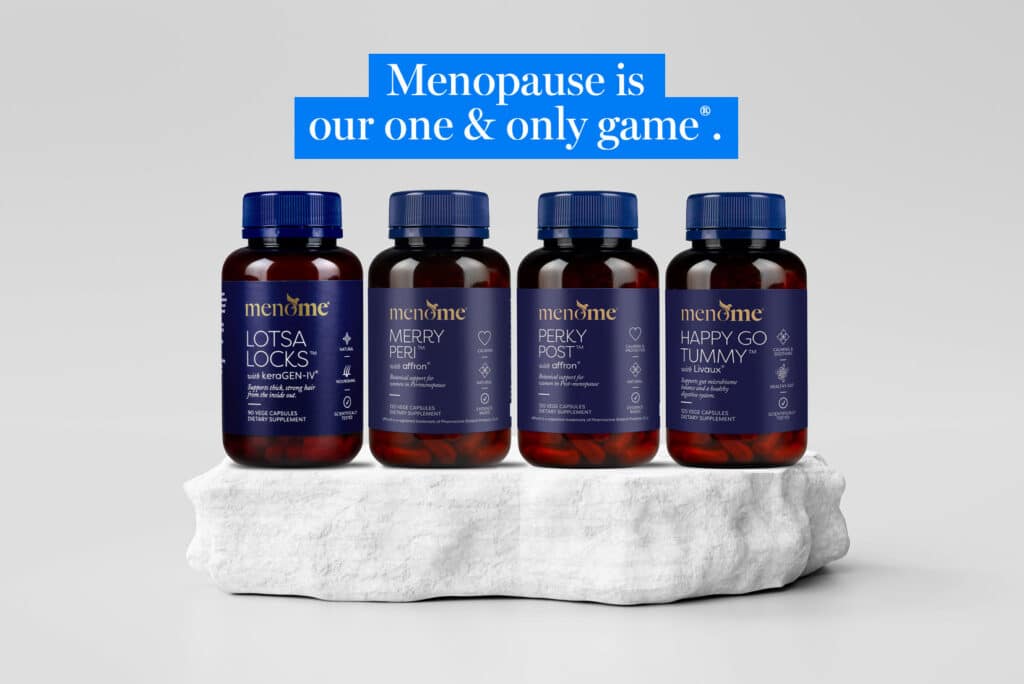Guess what? The age at which a woman starts perimenopause, or the lead-up to menopause is different for everyone. There is no such thing as a ‘perimenopause age’ – we asked 13 women what they wish they’d know.
The average age of menopause
There’s no average, many women haven’t even heard of perimenopause let alone realise that it usually begins in their 40s! In some cases, this happens as early as the 30s.
However, there are stats and the average age range for your last period to occur is 45-55 and perimenopause can start 10 years before. To be clear, we’re referencing natural menopause here, not a surgically induced event.
What women know
In my case, I’d heard of peri but I didn’t think it would affect me until my 50s. And I’m someone who works with women’s health and beauty! In hindsight, I probably began experiencing symptoms in my early to mid-40s but I had no idea. As I was undergoing fertility treatment at the time, I put a lot of the signs down to that. (Yes, I do realise this was grasping at straws but that’s another story.)
I’ve spoken to many others who’ve been blindsided by the advent of perimenopause. And when I asked our private Facebook group of 40+ Goddesses it was a common story
Education is thin on the ground
Here’s the thing. Girls are educated about puberty at school and we’re given a fat file of information when we fall pregnant. However, a lot of doctors don’t know much about menopause so education via that platform can be thin on the ground.
Taking inspiration and intel from 13 women here’s what they wish they’d known about peri.
What I wish I'd known about perimenopause
- That perimenopause was a ‘thing’ and my 40th birthday meant much more than ‘turning 40’. Hormonally speaking. Perhaps some of the choices I made due to ignorance of the effects of perimenopause would have been different.
- I wish I’d known that anxiety and depression were symptoms. I had been under an enormous amount of stress over a number of months. Once it eased, I was hit by a terrible tsunami of depression. MenoMe® was the only thing to ease this for me and I’m so grateful.
- It’s important to begin making lifestyle changes to support our bodies through the changes. These encompass nutrition, mindset and lifestyle.
- Even though I could still get pregnant it wasn’t likely and if that’s not something we want it’s important to use contraception. Every woman is different and many of the signs and symptoms of perimenopause mimic pregnancy.
- I’d like to have known about a lot of the symptoms especially aching joints and mood swings. Once I knew what was causing them, they affected me less.
- I didn’t even know that perimenopause was a thing. Then my period became irregular and I began experiencing daily night sweats at 38. When speaking to older female friends about my symptoms, they said “oh, it’s perimenopause”. I’d never heard of it, only of menopause and post-menopause. Why aren’t we talking about this? Why aren’t girls being educated about the end of fertility days?
- That I should have done more kegel exercises! (Ed’s note: urinary stress and urge incontinence can raise their unwelcome head. This 10-minute video is great for pelvic floor exercises you can do at home.)
- That crap foods would make me feel even more crap. (Ed’s note: ‘Nuff said.)
- That feeling you are turning into a crazy woman is a normal part of the journey. Anxiety/depression can increase. You can also experience heartburn like you haven’t had since you were pregnant. That you could experience period issues like flooding and heavy/irregular bleeding. So much so you wonder if you need an ambulance as you’ve never experienced flooding before. The MenoBelly! That the new tyre of fat around your belly is not because you haven’t done your sit-ups
- I think for me the physical stuff is irritating, annoying and on some days difficult to deal with. But the mental stuff is off the scale. The anxiety, depression and just a general feeling of mental fragility, like my coping skills have evaporated.
- That it can start way earlier than actual menopause. I had no idea that perimenopause was even a thing. I thought menopause was it. And what the symptoms are as well as the huge variations within those symptoms. Also, foods that help with hormones and have plant estrogens in them. (Download our free phytoestrogen foods sheet here.)
- I wish I knew I was going to explode around the middle. I went from being a size 10 my whole life to a 16 around my belly. And that I’d be a red hot mess and feel like I’m losing my mind. So I could prepare not only myself for the new me but my family also, especially my nearest and dearest.
- The rage, the tears, the mood swings. The fatigue, the irritation, the feeling of inadequacy and not knowing how long I’m going to feel like this. Periods were irregular for a few months and have now regulated again. Night sweats for a couple of years but now they’ve eased off again and are more random. It sucks! Especially when trying to navigate parenting (near 10 year old) and a relationship (not living together).
Knowledge is power
If you’re reading this and ‘you’re not there yet’ don’t let these words send you running to the hills! Rather use them to gain knowledge. There’s a common thread here. Once everyone knew what they were dealing with, they could help themselves and everything felt better.
‘I didn’t even know perimenopause was a thing’ was said often. It tells usthat many women STILL don’t know to expect perimenopause to come knocking, even in the 21st century!
The good news
The brilliant thing about learning this is that there is a lot we can do to mitigate the surprise symptoms.
Menopause is a life stage, not a medical condition. Knowing this allows us to manage it naturally. Every. Body. Is Different. There is no one size fits all. But making lifestyle shifts makes an enormous difference. Things like eating more unpackaged foods, moderating exercise and taking up self-care practices. It’s all in our hands. And if you need help getting there read through our extensive Learn section here or grab some coaching with Jenna here. MenoMe® is here to help guide and support you.
We’ve formulated Merry Peri®, Perky Post®, Happy Go Tummy® and LotsaLocks® with evidence-based ingredients to support you. Because we’re a group of women who have been through it or we’re going through it too! 💙
You can get your hands on them below.

Evidence-based botanical support
We use high quality, evidence based ingredients in all of our formulations to support you. Because we’re by women for women.
Main article photo by Valdemars Magone on Unsplash









